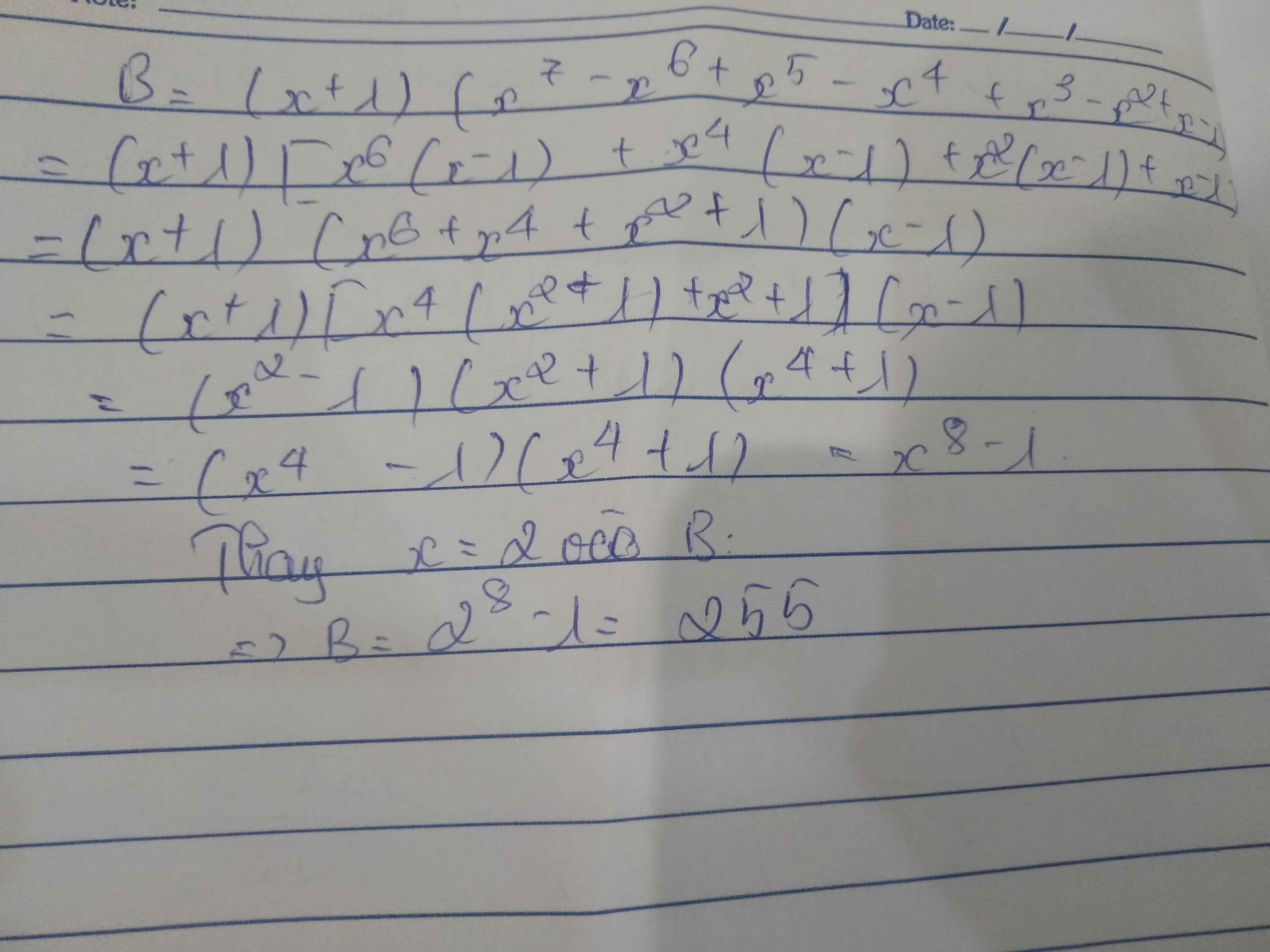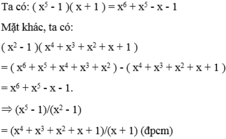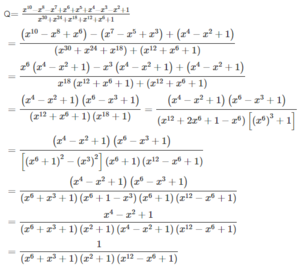
Hãy nhập câu hỏi của bạn vào đây, nếu là tài khoản VIP, bạn sẽ được ưu tiên trả lời.


Ta có: x=2
nên x-1=1
Ta có: \(B=\left(x+1\right)\left(x^7-x^6+x^5-x^4+x^3-x^2+x-1\right)\)
\(=\left(x+1\right)\left[x^6\left(x-1\right)+x^4\left(x-1\right)+x^2\left(x-1\right)+\left(x-1\right)\right]\)
\(=\left(x+1\right)\left(x^6+x^4+x^2+1\right)\)
\(=\left(x+1\right)\left(x+1\right)\left(x^4+1\right)\)
\(=\left(2^4+1\right)\left(2+1\right)^2=17\cdot9=153\)

1.
a/ \(\Leftrightarrow\left(x+1\right)\left(x^2+3x+2\right)+\left(x-1\right)\left(x^2-3x+2\right)-12=0\)
\(\Leftrightarrow\left(x+1\right)\left(x^2+2\right)+3x\left(x+1\right)-3x\left(x-1\right)+\left(x-1\right)\left(x^2+2\right)-12=0\)
\(\Leftrightarrow2x\left(x^2+2\right)+6x^2-12=0\)
\(\Leftrightarrow x^3+3x^2+2x-6=0\)
\(\Leftrightarrow\left(x-1\right)\left(x^2+4x+6\right)=0\Rightarrow x=1\)
b/ Nhận thấy \(x=0\) ko phải nghiệm, chia 2 vế cho \(x^2\)
\(x^2+\frac{1}{x^2}+3\left(x+\frac{1}{x}\right)+4=0\)
Đặt \(x+\frac{1}{x}=t\Rightarrow x^2+\frac{1}{x^2}=t^2-2\)
\(t^2-2+3t+4=0\Rightarrow t^2+3t+2=0\Rightarrow\left[{}\begin{matrix}t=-1\\t=-2\end{matrix}\right.\)
\(\Rightarrow\left[{}\begin{matrix}x+\frac{1}{x}=-1\\x+\frac{1}{x}=-2\end{matrix}\right.\) \(\Rightarrow\left[{}\begin{matrix}x^2+x+1=0\left(vn\right)\\x^2+2x+1=0\end{matrix}\right.\) \(\Rightarrow x=-1\)
1c/
\(\Leftrightarrow x^5+x^4-2x^4-2x^3+5x^3+5x^2-2x^2-2x+x+1=0\)
\(\Leftrightarrow x^4\left(x+1\right)-2x^3\left(x+1\right)+5x^2\left(x+1\right)-2x\left(x+1\right)+x+1=0\)
\(\Leftrightarrow\left(x+1\right)\left(x^4-2x^3+5x^2-2x+1\right)=0\)
\(\Leftrightarrow\left[{}\begin{matrix}x=-1\\x^4-2x^3+5x^2-2x+1=0\left(1\right)\end{matrix}\right.\)
\(\left(1\right)\Leftrightarrow x^4-2x^3+x^2+x^2-2x+1+3x^2=0\)
\(\Leftrightarrow\left(x^2-x\right)^2+\left(x-1\right)^2+3x^2=0\)
\(\Leftrightarrow\left\{{}\begin{matrix}x^2-x=0\\x-1=0\\x=0\end{matrix}\right.\) \(\Rightarrow\) không tồn tại x thỏa mãn
Vậy pt có nghiệm duy nhất \(x=-1\)

2: \(=\dfrac{\left(x-y\right)\left(x+y\right)\left(x^2+y^2\right)}{-\left(x-y\right)\left(x^2+xy+y^2\right)}=\dfrac{-\left(x+y\right)\left(x^2+y^2\right)}{x^2+xy+y^2}\)

xS = x.( 1 + x + x 2 + x 3 + x 4 + x 5 ) = x + x 2 + x 3 + x 4 + x 5 + x 6
=> xS – S = x + x 2 + x 3 + x 4 + x 5 + x 6 - 1 - x - x 2 - x 3 - x 4 - x 5 = x 6 – 1
Đáp án cần chọn là: A


Bài 2:
a.
\(3x(x-4y)-\frac{12}{5}y(y-5x)=3x^2-12xy-\frac{12}{5}y^2+12xy\)
\(=3x^2-\frac{12}{5}y^2=3.4^2-\frac{12}{5}.(-5)^2=-12\)
b.
\(u=\frac{-1}{3}; v=\frac{-2}{3}\Rightarrow u+v+1=0\)
\(2u(1+u-v)-v(1-2u+v)=2u(1+u+v-2v)+v(1+u+v-3u)\)
\(=2u.(-2v)+v(-3u)=-4uv-3uv=-7uv=-7.\frac{-1}{3}.\frac{-2}{3}=\frac{-14}{9}\)
Bài 1:
\(A=x^6-(x^6-x^5)-(x^5+x^4)+(x^4-x^3)+(x^3+x^2)-(x^2+x)+1\)
\(=-x+1=-(x-1)=-(999-1)=-998\)




Ta có: \(x.S - S = x\left( {1 + x + {x^2} + {x^3} + {x^4} + {x^5}} \right) - \left( {1 + x + {x^2} + {x^3} + {x^4} + {x^5}} \right)\)
\(\begin{array}{l} = x + {x^2} + {x^3} + {x^4} + {x^5} + {x^6} - 1 - x - {x^2} - {x^3} - {x^4} - {x^5}\\ = {x^6} - 1 \text{(đpcm)} \end{array}\)
Ta có: \(S=1+x+x^2+x^3+x^4+x^5\)
\(x\cdot S=x\left(1+x+x^2+x^3+x^4+x^5\right)=x+x^2+x^3+x^4+x^5+x^6\)
Do đó: \(x\cdot S-S=\left(x+x^2+x^3+x^4+x^5+x^6\right)-\left(1+x+x^2+x^3+x^4+x^5\right)\)
\(=x+x^2+x^3+x^4+x^5+x^6-1-x-x^2-x^3-x^4-x^5\)
\(=x^6-1\)(đpcm)